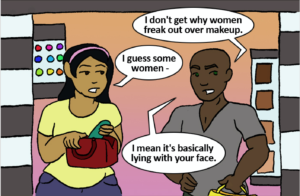
A sad person with looks at the viewer; another person’s hand is on their shoulder.
Originally published on The Body Is Not an Apology and cross-posted here with their permission.
It was after three years of struggling with my mental health when I finally came to terms with needing to see a therapist. I was coping with regular anxiety attacks, situational depression, and untreated trauma.
My reluctance to seek out professional help was due to a number of reasons that could be narrowed down to one overarching thing: the stigma that comes with admitting to mental health-related issues.
For a long time, I was under the impression that I had everything under control. I believed that the negative emotions would eventually subside and become easier to handle if I just gave them some time. I thought I would once again be (what I believed to be) “better.”
Yet, the opposite happened. I steadily got worse, experiencing anxiety attacks so regularly that they disrupted my day-to-day life and took a toll on my studies, work, and close relationships.
I finally had to admit to myself that my mental health should be prioritized over the fear that came attached to the stigma that I had been conditioned to feel.
And this conditioning that I, like many other people also experience, was largely due to my upbringing.
I had to realize that although stigma against mental illness is common across many cultures, my own experience has been specifically shaped by the experience of existing inside a Latinx body – and that several myths about mental health issues in Latinx cultures play a big role in people’s decisions not to seek out professional help for the mental health problems they experience.
Listed below are several of these myths.
Myth #1: These Things Don’t Happen to People Like Us
Growing up in Latinx households, we often hear the gossip about things that happen to other people’s families and the implied gratefulness that comes with not being part of that family.
Negative things always have to happen to other people, far enough removed so that it doesn’t taint our own family, but close enough to gawk at it like it’s our business.
This is the expectation of issues surrounding mental health – that they’re not supposed to happen to us.
In my own family, mental health was only talked about in passing: brief comments about someone else needing therapy, gossip about someone else’s mental breakdown and the “scene” that they “caused.”
There was an unspoken rule that mental health could only be talked about when it was brief and was about people who were at a safe distance from our family.
Since I didn’t have a space within my own family to talk about mental health without fear of being judged, I simply didn’t.
These types of things weren’t supposed to be happening to me. I wasn’t supposed to be having anxiety attacks or bouts of depression. I kept quiet about it as much as possible for as long as I could, hoping that it would all eventually resolve itself, and I wouldn’t have to bother anyone else with problems that felt taboo.
It wasn’t that anyone in my family had expressed negativity about mental health prior to this. However, I was still aware of the culture surrounding mental health and how it was believed to be something that didn’t happen within the walls of our household (despite the fact that we have all experienced trauma at some point in our lives).
Myth #2: Mental Health Issues Are Created or Exaggerated for Attention
We’re often under the impression that mental health issues only happen to other people, so we Latinxs sometimes extend this even further – to the point where anything related to mental health seems fake and considered “white people problems.”
Because mental health issues are believed to be a myth, they’re often considered a luxury only attributed to well-off white people who are thought to have the “privilege” to exaggerate their problems to the point where they genuinely think there is something wrong with them.
This disconnect created from assuming that mental health-related issues are exaggerated creates a culture where Latinxs don’t know how to pinpoint our own mental health problems.
The taboo nature of mental health within Latinx communities creates a lack of knowledge about mental health overall and perpetuates a cycle where we aren’t emotionally prepared to talk about mental health within our own families – thus further deepening whatever mental health issues are already present.
For me, this was a problem because I didn’t feel like I could safely talk about mental health. I spent my time trying to keep it a secret, having anxiety attacks behind closed doors and developing unrealistic expectations of myself that I couldn’t keep up with because I wasn’t in the headspace to do so.
By assuming that mental health issues are exaggerated for attention (content note: suicide), we unintentionally create an unsafe environment and close the door on loved ones who may need to seek professional help for whatever they’re dealing with.
Myth #3: What Happens at Home Stays at Home
Even when mental health issues are recognized within Latinx families, there is sometimes an issue of privacy.
This can prevent people from seeking professional help because they either don’t want family members to find out that a stranger is being told private family information, or that the individual is going around claiming to suffer from a mental illness.
When privacy is the top concern of a family, it’s damaging to the person who is dealing with mental health problems.
Despite patient-therapist confidentiality, the fear of family members finding out and exhibiting anger or aggression may be enough to prevent someone from seeking professional help.
Sadly, the stigma of allowing a professional into a person’s private life, even in the pursuit of healing, is still taboo in our culture.
Myth #4: Going to Therapy Is a Sign of Weakness
As Latinxs, we are often recognized for our self-resilience and pride. This can create stubbornness that can lead to refusing to seek help when dealing with mental health-related problems.
When seeking therapy is seen as an admission of weakness, unresolved mental health issues can get worse as they continue to be ignored.
This stigma against seeking professional help led to my mental health worsening with time. Instead of getting better, as I assumed it would, I ended up getting to a point where I couldn’t function on a daily basis because I had too much unresolved trauma.
If I hadn’t been taught to believe that therapy was a sign of weakness and had, instead, sought out help from the beginning, I could have avoided years of unrest, anxiety, and breakdowns.
Creating a culture against seeking help for mental health is so deeply rooted into our Latinidad that it often isn’t even considered an option for many people. This stigma against therapy also usually goes unspoken. Even then, it is such a prominent reality for many Latinx families that it often hinders healing.
Myth #5: Mental Health Is Cured through Home Remedies and Spirituality
While natural medicine and spirituality can do wonders for a person’s mental health, these being such a great focus in Latinx communities means that sometimes people don’t seek out medical attention when necessary.
When dealing with mental health, it’s important for a person to know all of their options, as it’s likely that different approaches will work for different people.
Vic’s VapoRub may work with colds, and praying a rosary may work when dealing with the absolution of various sins, but these alone couldn’t have resolved the worst of my mental health problems.
It’s a running inside joke with many young Latinx folk that our parents/grandparents can be deeply rooted in home remedies and spiritual practices ranging from Catholicism to Indigenous rituals. They pass on these rituals to us, but it’s a reality that sometimes people rely on these rituals to the point they become a hindrance instead of a help.
Home remedies and spiritual practice are powerful healing tools when dealing with mental health, but it is important for Latinx communities to also embrace the availability of traditional therapy and medication, which is a valuable resource for those who need it.
If stigma surrounding mental health in Latinx communities persists, healing of any type will be twice as hard to attain.
It’s crucial that we dismantle the stigma against seeking professional help for one’s mental health and that we provide space in our community to talk about mental health without fear of judgment or accusation.
***
To learn more about this topic, check out:
- 5 Ways Mexican Queerness Is a Radical Act Against Colonialism & Machismo
- 7 Things My Unruly, Curly Hair Taught Me About Being Unapologetically Latinx
- Navigating the Whiteness of Countercultures in a Brown and Fat Body
- Afro-Latino: 6 Women Open Up About Being Black And Latina
[do_widget id=’text-101′]
Erika Ruiz is a full-time student at the University of Redlands, where she is actively studying creative writing with a double emphasis in creative non-fiction and poetry. Ruiz is a practicing poet and non-fiction writer who is also passionate about activism and justice work.
Search our 3000+ articles!
Read our articles about:
Our online racial justice training
Used by hundreds of universities, non-profits, and businesses.
Click to learn more




















